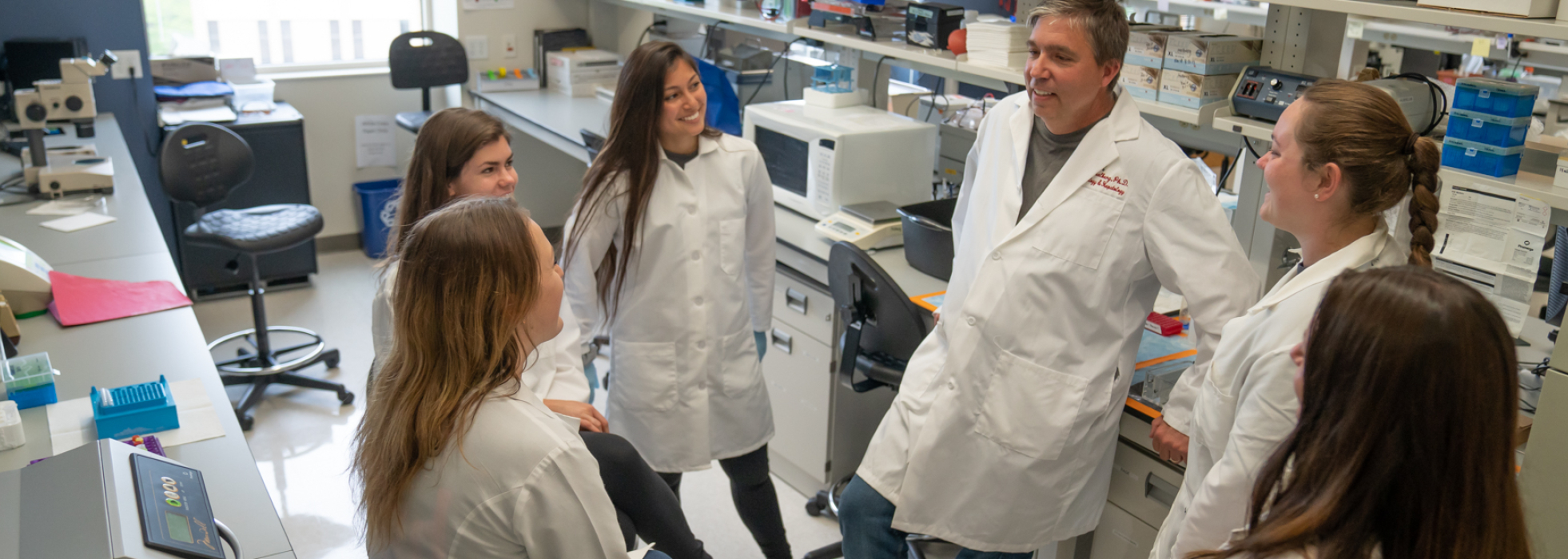Gastrointestinal Cancer Biology
Richard Halberg, PhD, is an established cancer biologist whose research focuses on understanding the origin of gastrointestinal cancers and how it impacts all aspects of tumor biology, especially response to therapeutic intervention.
Dr. Halberg’s research team disproved a longstanding paradigm in the field of cancer biology by demonstrating that solid tumors can be “born bad with a talent for trouble” by generating sophisticated mouse models and analyzing samples from unique patient cohorts.

Cellular and Molecular Mechanisms of Colorectal Cancer
Colorectal cancer (CRC) is a leading cause of cancer death worldwide. Dr. Halberg's research team has elucidated cellular and molecular mechanisms that drive the formation of CRC. They demonstrated that many intestinal tumors often arise as an initial progenitor that facilitates the transformation of neighboring progenitors to form a complex multi-ancestral tumor consisting of several molecularly distinct mutant clones.
This recruitment process is only beginning to be understood, but recent technological advances, including transwell assays and spatial transcriptomics will allow us to further elucidate how mutant clones “educate” each other and interact with cells in the surrounding microenvironment to affect all aspects especially treatment response.
The Halberg team has developed sophisticated mouse models to track mutant clones in tumors over time. Each clone is labeled with a unique reporter fluorescing blue, green, red, or yellow (see image below).
This powerful experimental platform allows researchers to monitor the response of a tumor, as well as each individual mutant clone to a single drug or novel combination of drugs, and subsequently develop a much more complete understanding of treatment successes and failures owing to intrinsic and acquired resistance.
Surprisingly, the team has found that clones resistant to a particular treatment can protect clones that are sensitive, which of course further complicates the development of a cure. Insights in to treatment response like this are absolutely necessary to effectively move experimental drugs from the bench to bedside.
Research Team
Lab Manager
Postdoctoral Fellow
Graduate Assistant
GWIS Madison Chapter Ruth Dickie Research Scholarship Award recipient (2023)
Scientist
Scientist

We respect work-life balance and seek diversity in our team to create a positive environment to learn, teach, and perform scientific studies.
Team members at all levels have received several awards at the institutional, regional, and national level. Recently, Rich won the Michigan State John A. Boezi Memorial Alumnus Award (2023) and Santina won the Elegbede Cancer Research Award (2022) and the David Wissler Award (2023).
If you are interested in joining our group, please send your CV and a brief description of your research experience and interests to Dr. Halberg.
Active Projects
- Identifying Molecular Subtypes of Colorectal Cancer
Understanding the Contribution of Colorectal Cancer Tumor Characteristics to Disparities in Colorectal Cancer Survival
NIH/NCI R01CRC tumors from African Americans are often much more aggressive than those from non-Hispanic whites. The goals are to characterize CRC tumors for important prognostic markers: MSI, BRAF and RAS mutation status, clinicopathologic markers, and the established consensus molecular subtypes; identify novel, tumor-based gene-expression subtypes among African American CRC patients; and measure systematic differences in CRC survival between patient cohorts.
- Understanding Clonal Interactions and Their Implications for Tumor Biology
Understanding adenoma progression: Interplay among tissue microenvironment, clonal architecture, and the gut microbiome
NIH/NCI U54The goals are to determine whether a primed colon possessing pre-existing mutations in cancer driver genes accelerates the expansion of APC-deficient crypts and subsequently adenoma formation and progression, determine whether a primed colon overloaded with senescent fibroblast favors adenoma formation and progression, and determine whether interacting clones in a multi-ancestral tumor “educate” each other through paracrine signals that alter gene expression.
- Testing of Experimental Drugs
Innovative mouse model of colon cancer to test novel radioimmunotherapy
Transdisciplinary Cancer Immunology-Immunotherapy Pilot ProjectThe goal is to determine treatment efficacy and interrogate both intrinsic and acquired mechanisms of resistance to immunotherapy, radiation treatment, and their combination using novel mouse models of colorectal cancer.
- Development of New Animal Models of Cancer
Rapid Personalized Porcine Cancer Model for Innovating Drug and Medical Device Development
UW Promoting Industry Collaboration InitiativeThe goal is to genetically engineer a line of Wisconsin Miniature Swine™ with the innate ability to produce clinically relevant tumors with desired oncogenic mutations and intratumoral heterogeneity in a location- and time-specific manner through induced genome "self-editing."
Funding Support
Dr. Halberg's research has been supported by external grants from the American Association of Cancer Researchers, the American Cancer Society, NASA, and NIH; industry/institutional awards from Centene, Promega, UW Promoting Industry Collaboration Initiative, and UW Microbiome Initiative; and generous gifts, especially from the Wisconsin Dual Sport Riders.





